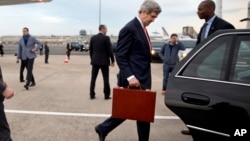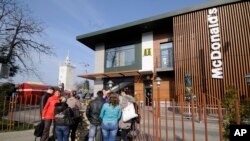PARIS —
U.S. Secretary of State John Kerry and Russian Foreign Minister Sergei Lavrov are scheduled to meet in Paris Sunday as Washington and Moscow work toward a political solution to the crisis in Ukraine.
Kerry and Lavrov will meet at the residence of the Russian ambassador to follow up on a late Friday telephone conversation between Russian President Vladmir Putin and U.S. President Barack Obama about the need for a diplomatic settlement.
The White House says Obama told Putin that Russia must pull back troops from the Ukrainian border and not move deeper into Ukraine. The Kremlin says Putin is suggesting "possible steps the global community can take to help stabilize the situation."
In coordination with the new interim government in Kyiv, Washington is pressing Russia to open talks to defuse tensions and allow international monitors into the disputed region of Crimea to assure the safety of Ukrainians who are based there.
In a Moscow-backed referendum, Crimeans voted to leave Ukraine and join Russia following last month's collapse of the pro-Russian government in Kyiv. But most of the international community refuses to recognize the results of that referendum, and many Western nations have already imposed economic sanctions against Russia. Preliminary indications suggest those moves are already affecting the Russian economy, and the United States and its European allies are also threatening tougher sanctions if Russia's troops push deeper into Ukraine.
Apparent progress toward easing the most serious U.S.-Russian standoff since the end of the Cold War follows Moscow's insistence that it will go no further than annexing Crimea — for now. Lavrov spoke Saturday on Russian television.
"Russia has absolutely no intention of — or interest in — crossing Ukraine's borders," Lavrov said in the televised statement.
"Moscow wants only for the work to resolve the crisis to be multilateral," he added, explaining that he would want any negotiated agreement to stop what he calls "riots that the West is trying to cover up."
Kerry had been heading back to Washington from Saudi Arabia, where President Obama met with King Abdullah Friday, when he learned of Lavrov's comments. The secretary's plane changed course during a refueling stop in Shannon, Ireland, and headed for Paris.
Kerry and Lavrov enter Sunday's talks with what American University professor Keith Darden calls distinctly different views of Ukraine — with Moscow seeing a chaotic, U.S.-backed rebellion that threatens Russian interests, while Washington sees a "somewhat messy" move toward more representative rule.
"So the Maidan, for us, was democratic mobilization," Darden said. "For the Russians, it's Western-sponsored regime change. And I think that gap is just going to be there. This is a fundamental difference in the way our two countries see the world. And that's not going away anytime soon."
Putin mum
Lavrov's pledge that Russia "absolutely" will not make any military move into Ukraine was not followed by any official statement giving President Putin's views on the matter. The Kremlin leader initiated the telephone contact with President Obama Friday, but some observers say it is unclear whether Putin will explicitly confirm his foreign minister's comments. Some observers have suggested that Moscow may be reacting to its growing isolation over the Ukraine issue.
Ukraine's immediate neighbors — former Soviet republics that broke away from Moscow more than 20 years ago — and the Kremlin's former allies in Eastern Europe have strongly denounced Russia's pressure on Ukraine, and their views have echoed throughout Western Europe. The United Nations General Assembly also voted overwhelmingly to oppose Russia's annexation of Crimea earlier this month.
The ongoing Russian military buildup around Ukraine raised fears that Putin's policies were steering his nation toward "a new Cold War." U.S. officials estimate Russia has amassed 40,000 troops close to Ukraine's borders; Ukrainian government officials contend the Russian buildup around their northern, eastern and southern borders is closer to 100,000 troops.
Elections
In Ukraine Saturday, opposition leader Vitaly Klitschko dropped out of the race for president and threw his support behind billionaire businessman Petro Poroshenko.
Ukraine's former president Viktor Yanukovych left Kyiv for asylum in Russia after large-scale demonstrations against him last month, and the parliament in Kyiv called a presidential election for May.
Klitschko, a former world heavyweight boxing champion, told delegates from his Ukrainian Democratic Alliance for Reform party the only way for the opposition to take over full control in Ukraine is to nominate, support and elect "a single candidate representing democratic forces."
Poroshenko and former prime minister Yulia Timoshenko are now the clear frontrunners in the May 25 election.
Tymoshenko was freed from prison amid the tumult of the Yanukovych uprising. Yanukovych had defeated her in Ukraine's previous presidential election, in 2010. Until last month she had been jailed since 2011 on charges of abuse of office.
PHOTOS: Developments in Ukraine and the Crimean Peninsula
Kerry and Lavrov will meet at the residence of the Russian ambassador to follow up on a late Friday telephone conversation between Russian President Vladmir Putin and U.S. President Barack Obama about the need for a diplomatic settlement.
The White House says Obama told Putin that Russia must pull back troops from the Ukrainian border and not move deeper into Ukraine. The Kremlin says Putin is suggesting "possible steps the global community can take to help stabilize the situation."
In coordination with the new interim government in Kyiv, Washington is pressing Russia to open talks to defuse tensions and allow international monitors into the disputed region of Crimea to assure the safety of Ukrainians who are based there.
In a Moscow-backed referendum, Crimeans voted to leave Ukraine and join Russia following last month's collapse of the pro-Russian government in Kyiv. But most of the international community refuses to recognize the results of that referendum, and many Western nations have already imposed economic sanctions against Russia. Preliminary indications suggest those moves are already affecting the Russian economy, and the United States and its European allies are also threatening tougher sanctions if Russia's troops push deeper into Ukraine.
Apparent progress toward easing the most serious U.S.-Russian standoff since the end of the Cold War follows Moscow's insistence that it will go no further than annexing Crimea — for now. Lavrov spoke Saturday on Russian television.
"Russia has absolutely no intention of — or interest in — crossing Ukraine's borders," Lavrov said in the televised statement.
"Moscow wants only for the work to resolve the crisis to be multilateral," he added, explaining that he would want any negotiated agreement to stop what he calls "riots that the West is trying to cover up."
Kerry had been heading back to Washington from Saudi Arabia, where President Obama met with King Abdullah Friday, when he learned of Lavrov's comments. The secretary's plane changed course during a refueling stop in Shannon, Ireland, and headed for Paris.
Kerry and Lavrov enter Sunday's talks with what American University professor Keith Darden calls distinctly different views of Ukraine — with Moscow seeing a chaotic, U.S.-backed rebellion that threatens Russian interests, while Washington sees a "somewhat messy" move toward more representative rule.
"So the Maidan, for us, was democratic mobilization," Darden said. "For the Russians, it's Western-sponsored regime change. And I think that gap is just going to be there. This is a fundamental difference in the way our two countries see the world. And that's not going away anytime soon."
Putin mum
Lavrov's pledge that Russia "absolutely" will not make any military move into Ukraine was not followed by any official statement giving President Putin's views on the matter. The Kremlin leader initiated the telephone contact with President Obama Friday, but some observers say it is unclear whether Putin will explicitly confirm his foreign minister's comments. Some observers have suggested that Moscow may be reacting to its growing isolation over the Ukraine issue.
Ukraine's immediate neighbors — former Soviet republics that broke away from Moscow more than 20 years ago — and the Kremlin's former allies in Eastern Europe have strongly denounced Russia's pressure on Ukraine, and their views have echoed throughout Western Europe. The United Nations General Assembly also voted overwhelmingly to oppose Russia's annexation of Crimea earlier this month.
The ongoing Russian military buildup around Ukraine raised fears that Putin's policies were steering his nation toward "a new Cold War." U.S. officials estimate Russia has amassed 40,000 troops close to Ukraine's borders; Ukrainian government officials contend the Russian buildup around their northern, eastern and southern borders is closer to 100,000 troops.
Elections
In Ukraine Saturday, opposition leader Vitaly Klitschko dropped out of the race for president and threw his support behind billionaire businessman Petro Poroshenko.
Ukraine's former president Viktor Yanukovych left Kyiv for asylum in Russia after large-scale demonstrations against him last month, and the parliament in Kyiv called a presidential election for May.
Klitschko, a former world heavyweight boxing champion, told delegates from his Ukrainian Democratic Alliance for Reform party the only way for the opposition to take over full control in Ukraine is to nominate, support and elect "a single candidate representing democratic forces."
Poroshenko and former prime minister Yulia Timoshenko are now the clear frontrunners in the May 25 election.
Tymoshenko was freed from prison amid the tumult of the Yanukovych uprising. Yanukovych had defeated her in Ukraine's previous presidential election, in 2010. Until last month she had been jailed since 2011 on charges of abuse of office.
PHOTOS: Developments in Ukraine and the Crimean Peninsula





